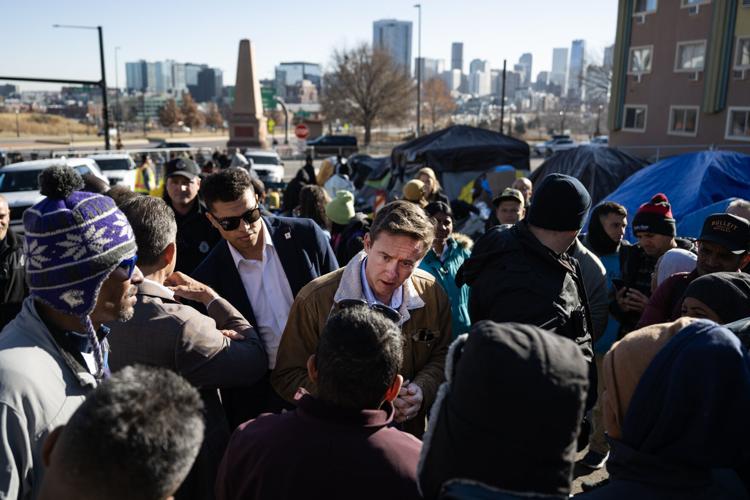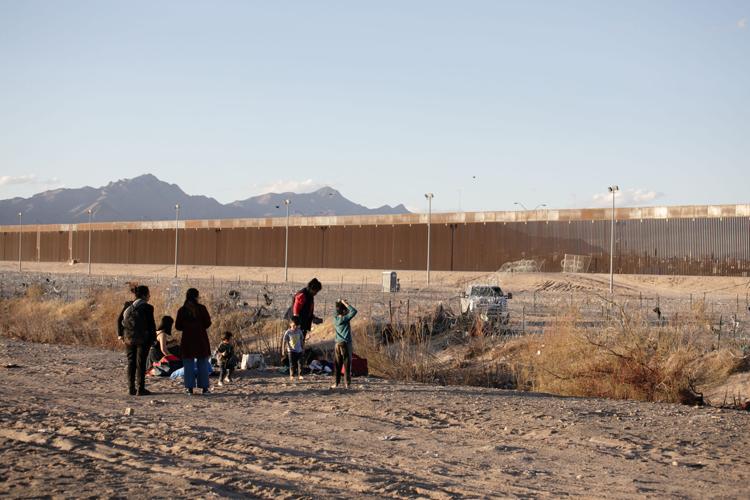Douglas County aims to challenge Colorado’s sanctuary laws amid illegal immigration surge in Denver
Douglas County’s commissioners are eyeing a legal challenge to Colorado’s “sanctuary” laws amid a surge in illegal immigration that has already cost Denver — the epicenter of the crisis — tens of millions of dollars.
They also advanced a proposed ordinance that bars commercial buses from unloading passengers “other than at a planned and scheduled documented destination,” a clear attempt to stop immigrants from arriving at the county’s doors unannounced.
In a resolution, the commissioners on Tuesday directed the county attorney to “pursue legal action to permit the county to fully cooperate with federal law enforcement.”
The resolution says the county “acknowledges there is an immigration crisis in the United States” and that state laws prohibiting local government from working with federal immigration officials “exacerbates that crisis.”
Broadly speaking, a “sanctuary” jurisdiction is a designation given to municipalities, counties or states that establish policies to discourage local law enforcement from reporting an individual’s immigration status to federal authorities.
Douglas County’s actions address two state laws: The first, passed in 2019, prohibits local governments from cooperating with the federal government in immigration enforcement and prohibits the sharing of judicial information with federal officials.
The second, passed last year, bars local government involvement in immigration detention.
Douglas County Commissioner Abe Laydon said on Friday the county has a “responsibility” to honor immigrants coming into the county legally.
“We believe in leading with compassion, but it’s not compassionate to bring migrants to a cold climate without the right resources and no place warm to stay,” Laydon said. “We know why people want to come to America — and specifically Douglas County — yet we have a responsibility to honor those who do so through proper channels and we welcome those who do.”
Since December 2022, nearly 40,000 immigrants — many of whom illegally crossed America’s southern border — arrived in Denver, a sanctuary city where officials decided earlier in the crisis to provide shelter, feed and transport immigrants to their final destination. Many have been bussed from El Paso by Texas Gov. Greg Abbott.
That decision has come with a high price tag — more than $59 million and counting. To date, the state and federal government have reimbursed Denver roughly $14 million, with the rest of the cost borne by the city’s taxpayers.
Denver is surrounded by counties and cities that have deliberately avoided being tagged with a “sanctuary status.” Some officials worried about getting saddled with the costs after seeing what’s unfolding in Denver and have gone further to try and deter immigrants from coming into their territories.
Douglas County is one of them.
Laydon is not yet sure exactly what the process of challenging those state laws will be pending conversations with the county attorney. There are a variety of channels the county can take to challenge those laws, which the board will be advised on by the county attorney before moving forward.
The commissioners also approved, on first reading, a proposal that says “the driver of a commercial passenger vehicle shall not stop such vehicle in unincorporated Douglas County, Colorado for the purpose of unloading passengers other than at a planned and scheduled documented destination.”
The proposal defines “scheduled documented destination” to mean a “preplanned destination or stop on a planned route to a destination that can be demonstrated by a departure and arrival schedule, passenger ticket, receipt, or other publicly available document depicting the location where passengers are planned to unload.”
The proposal also requires the driver to “maintain documentation” to demonstrate that passengers are being unloaded at a “scheduled documented
destination.”
Violation will result in a fine of up to $1,000 for each separate incident, according to the proposal, which is scheduled for a second reading on March 26 and will go into effect immediately if passed.
The unloading of commercial passengers in unplanned locations is “detrimental to the health, safety, and welfare of the community where the commercial passengers are unloaded,” the proposed ordinance says.
Douglas County Commissioner Lora Thomas said since the federal government is not taking action at the border, the proposed ordinance is “necessary.”
“The national migrant crisis has forced Denver to cut local services for residents,” Thomas said. “We have an obligation first to our citizens, and we see what’s happening in Denver as a warning sign to be proactive here in Douglas County.”
Laydon said he hopes the two actions on Tuesday will help the county avoid over-tapping its resources.
Following the recent snowstorm that swept the metro Denver area Wednesday and Thursday, Laydon said he’s not sure how immigrants handled the weather — emphasizing his point that encouraging immigrants to come to the metro Denver and its climate is not compassionate.
“The people who are seeking asylum and being bussed here are being misled, being told this is a safe place with a lot of resources and tons of money and we’re a sanctuary region and that’s just not true,” he said. “This is not a climate for people to come to and the money does not exist to care for them.”








